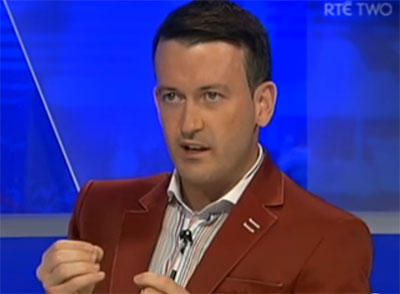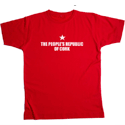Uptalk: The Vocal Virus Infecting the Nation
20th Aug 2013
‘Uptalk’ has gathered such momentum in Ireland that it now affects a huge portion of all Irish accents. Uptalk is a rising vocal inflection that makes statements sound like questions:
So, I met Finbarr today? He was up at the match at the weekend? He said he might be going out tonight?
For listeners it is distracting and unsettling because it sounds like the speaker is looking for a prompt to continue or is unsure of what they are saying. There are a few theories on where this strange but prolific intonation came from.
|
Nail on the head (bar the intro and odd choice of filming location) |
Anecdotal evidence suggests it is adopted from the ultra-annoying Valley Accent – the affluent San Fernando Valley in Southern California – and popularised in the sitcom ‘Friends’.
More academic research shows that uptalk was first documented in New Zealand in the late eighties and spread quickly to Australia where comedians like Adam Hills have continually ridiculed it – unfortunately, in vain.
At the People’s Republic of Cork we find accents fascinating. Aside from the actual meaning of the words and sentences we speak, each phrase and syllable is delicately layered with intriguing vocal patterns and peppered with musical slants that allow the listener’s brain to learn more about us.
| Adam Hills on the Aussie accent inflection |
More than that however, listeners use our accents to establish our identity and to learn more about us – one of the first questions you might ask when chatting to a stranger is ‘where are you from?’.
Psychology studies have shown that humans who are more insecure or uncomfortable with their identity or status are more likely to alter their accents – usually to fit in with a peer group. Accent-change has been shown to be more common among women and younger people.
Music to Our Ears
Even though accents are something we rarely think about consciously our brains are continuously processing speech patterns and attaching labels to those we listen to. Our brains love patterns and are constantly trying to predict what’s coming next – that’s why when you puck a sliotar or throw a frisbee and it goes exactly where your brain intended you get rewarded with a small release of dopamine.
When our brains fail to get a prediction right, like catching a falling sliotar, it doesn’t like it!
| You can nearly tell Rob's address from his Ballyphehane/Togher accent |
Similarly our brains tend to prefer major harmonics in music over minor dissonant ones. Why? If someone sings a single note and a bunch of backing singers chip in with bright major harmonies our brains enjoy the pattern more (nerd alert: because all the harmonies are whole number multiples of the frequency of the original note). If a musician plays a bum note or a drummer plays out of time our brains dislike it because the pattern it was predicting was broken.
In a regular conversation between two people who share the same accent, as well as focussing on the actual content of the communication, both brains are subconsciously monitoring all the tiny cadences and tonal swings. If one person drops in an unexpected intonation or a word that is normally not associated with their accent then the brain changes its overall picture of the speaker.
Let’s say one of your best buds is back from Australia and starts tacking ‘mate’ on to the end of most his sentences or your sister comes down from a year of college in Dublin and has started replacing ‘ye’ with ‘youz’ then your brain is likely to get partially distracted from the conversation while it tries to deal with the surprise it didn’t predict.
|
Nice mix of genuine accents in this clip from the 2013 Cork V Dublin hurling clash |
To your brain it’s a ‘funny peculiar’ quirk it didn’t expect from the speaker and it’s not unusual to feel annoyed by it even though it’s hard to understand or articulate why.
Before long though, those who slightly alter their accents will revert back to their original accent and phrases – almost all of this happens subconsciously – to fit in with their peers.
 |
| Miriam O'Callaghan and Marian sorry-Im-completely-out-of-time Finucane are two of RTE's biggest uptalkers |
However with national broadcasters like Marian Finucane and Miriam O’Callaghan and Red FM’s Victor Barry now regularly using uptalk the vocal virus is spreading like wildfire.
It isn’t totally unreasonable to suggest that in a few years an All-Ireland winning captain might ascend the Hogan Stand and shout into a microphone:
Tá athas orm an corn seo a ghlacadh? Ar son an foireann seo?
…while the rest of us face-palm ourselves in disbelief.
While globalisation has brought the world benefits there are downsides too. In accent terms, uptalk’s globalisation means interesting native accents, like minority languages, are edged out in favour of more popular and generic ones and an area’s distinct characteristics start to fade and ultimately sameness is boring.
 |
|
Donal Óg guilty of uptalk on The Sunday Game after the Limerick V Clare match. (RTE Player 25m:50sec) |
If you, like us, delighted in World Champion Rob Heffernan’s Togher tones being broadcast around the world after his gold medal victory in Moscow then good on you. If you feel embarrassed when you hear a strong Cork or other Irish accent in the media then that says far more about you than great men like Rob Heffernan.
Our accent consistently comes up trumps as the most endearing and interesting English language accents so let’s ditch the silly uptalk* and stick with the beautiful accent that has been handed down by the generations of Cork people that have gone before us.
* asking someone to give you a dawk in the shoulder you when you accidentally uptalk is highly recommended.















